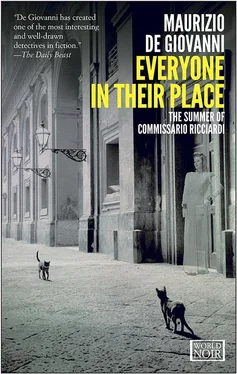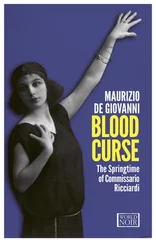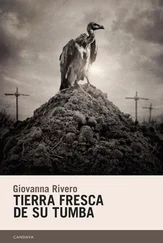Maurizio de Giovanni - Everyone in Their Place
Здесь есть возможность читать онлайн «Maurizio de Giovanni - Everyone in Their Place» весь текст электронной книги совершенно бесплатно (целиком полную версию без сокращений). В некоторых случаях можно слушать аудио, скачать через торрент в формате fb2 и присутствует краткое содержание. Жанр: Исторический детектив, Полицейский детектив, на английском языке. Описание произведения, (предисловие) а так же отзывы посетителей доступны на портале библиотеки ЛибКат.
- Название:Everyone in Their Place
- Автор:
- Жанр:
- Год:неизвестен
- ISBN:нет данных
- Рейтинг книги:4 / 5. Голосов: 1
-
Избранное:Добавить в избранное
- Отзывы:
-
Ваша оценка:
- 80
- 1
- 2
- 3
- 4
- 5
Everyone in Their Place: краткое содержание, описание и аннотация
Предлагаем к чтению аннотацию, описание, краткое содержание или предисловие (зависит от того, что написал сам автор книги «Everyone in Their Place»). Если вы не нашли необходимую информацию о книге — напишите в комментариях, мы постараемся отыскать её.
Everyone in Their Place — читать онлайн бесплатно полную книгу (весь текст) целиком
Ниже представлен текст книги, разбитый по страницам. Система сохранения места последней прочитанной страницы, позволяет с удобством читать онлайн бесплатно книгу «Everyone in Their Place», без необходимости каждый раз заново искать на чём Вы остановились. Поставьте закладку, и сможете в любой момент перейти на страницу, на которой закончили чтение.
Интервал:
Закладка:
Many of the faithful exchanged glances of bafflement: where was the priest heading with this? They’d be carrying the Madonna in the procession, certainly not the chain. After a pause, Don Pierino went on:
“In fact, the chains that most of us know are bad chains: the chains of slavery, the chains of incarceration. The chains of the soul, of the senses, of wickedness and evil. But there are also good chains, like the ones that protected the Madonna of the painting in its crate, all the way to the beach of Santa Lucia nearly a century ago. But the best chain, the chain most possessed of goodness that can be imagined, is the chain that binds humanity to God, God who fashioned humanity in His image.”
Ricciardi was listening, fascinated in spite of himself. He was no believer, and it seemed to him that, given the life he led, it would be impossible to be one; but faith was a balm he envied others, a comfort to the luckier ones who possessed it.
“The chain that binds God to man is strong, and it withstands nature and the elements. It is the chain that binds a father to a son, a chain that never rusts or wears away with time. A chain that God will never break, a chain that in fact He made stronger through the sacrifice of His only begotten son.”
Ricciardi saw a father, ahead of him, caressing the head of a little girl who kissed his hand in response.
“And so we might think,” Don Pierino went on, “that this chain which can withstand even God Himself can never be broken. Unfortunately, that is not the case. There is a way to shatter this chain: a terrible pair of shears, that can inflict this irreparable damage.”
The priest sought out Ricciardi in the crowd and found him again, gazing straight into his eyes.
“This pair of shears is sin: a formidable weapon, which God himself gave to us so that we might choose not to employ it, saving our souls with free will. Sin shatters the chain: it separates us from God and lets us drop directly into hell and damnation.”
With Don Pierino’s eyes leveled directly into his own, Ricciardi noticed a new sense of discomfort spreading inside him; he began to feel his heart racing loudly in his throat, as if he were about to faint. He leaned against a nearby column while he tried to regain his equilibrium. What was happening to him? As if muffled by fog, the priest’s voice came to him, through the subdued rustling of the women’s fans-whipping back and forth incessantly:
“Sin shatters the link, the most important link in the chain. It shatters the link that cannot be replaced, and without it there is no longer any contact between us: the chain no longer exists, only two useless parts of chain exist. The most important iron ring of all those that make up the chain is the one that’s missing. By committing a sin, you’ve removed the link.”
Ricciardi’s jaw dropped: before his feverish, smarting eyes, in his blurred vision, to his mind ravaged by the thousands of instances of suffering to which he was a daily witness, the truth suddenly blazed clearly in its simplest and most unmistakable form. He understood: he understood it all.
Making his way through the crowd of the faithful, while Don Pierino climbed down from the pulpit and went back to the main altar, he emerged into the open air, the gray muggy heat, and he inhaled in long, hungry gulps: the world was spinning around him dizzyingly. He felt like an idiot, a dull-witted fool who’d failed to see what was obvious, the truth that lay right before him.
He pushed past people, making his way upstream through the crowd pushing back toward the marina to enjoy the spectacle of the ’Nzegna. He walked and no one noticed him, no one seemed to see him at all as he made his way upstream through the masses. He was reminded of Sofia Capece, who was convinced she’d become invisible by divine intervention: the angel of death.
Perhaps the woman, in her madness, had had a point. Those who bring death and damnation really are invisible.
The Colombo family was getting ready for the Sunday lunch, but there was something in the air that didn’t seem right.
It wasn’t the humidity, nor was it the gray daylight that filtered in through the open window: it was, rather, a question of atmosphere. Even the children, who usually talked all at once in a cheerful, deafening cacophony, had fallen silent and exchanged baffled glances. There was a reason.
The reason was Enrica.
Usually the young woman was a smiling, quiet presence in the apartment, and she filled the kitchen with her serene, hard-working sweetness. She was part of the family and, in a very real sense, its true core. But today she loomed like an omen of some impending disaster: her eyes swollen, behind sunglasses, her tangled hair, her reddened cheeks.
It was obvious that she had been crying, shut up in the bedroom she hadn’t left since that morning. Her mother and her sister, both worried by that unusual behavior, had gone to knock on her door, but they’d received only a terse reply; finally they’d resigned themselves to making lunch without her, exchanging bewildered glances without a word.
Giulio, for his part, was clearly glowering with grim discomfort: he was no longer willing to tolerate the fact that his daughter was manifestly suffering, and there was no mistaking the reason. He hadn’t worked his whole life so he could condemn his beloved Enrica to a fate that went against her will; if he had to, he’d support her for all the years she wished, and then leave her enough to live on with all due dignity. And if his wife didn’t agree with him, that would be too bad for her.
Just as he was about to put down his fork and express his thoughts aloud, Enrica beat him to it, speaking in a calm and unruffled voice:
“Mamma,” she said, “I know you only want what’s best for me and you’re worried because at my age I’m still not engaged to be married.”
One of her younger brothers stifled a nervous giggle behind one hand, prompting an angry glare from his father. Enrica went on:
“But I would beg you to consider that, precisely because I am now and have been for some years an adult, I am also capable of deciding what I want from my life. And what I do not want. Mamma, don’t take this the wrong way: but I never want to see that man, Sebastiano Fiore, again as long as I live.”
The phrase tumbled out into the silence of the tomb. A distant rumble of thunder came in through the window, sounding like an airplane going overhead.
Maria shot a fiery glance at her daughter, but the girl looked back with her customary tranquil determination. At that point, the woman tried on a conciliatory tone:
“How on earth can you say such a thing? Has he somehow disrespected you, is there something wrong with him? Do you think you deserve better? Don’t you like his family? Or is it. .”
Enrica raised one hand to stem the rising tide of questions.
“No, Mamma. Nothing like that. It’s simpler than that: I don’t love him.”
“But you could get used to him, in time. Perhaps, a little at a time. .”
“I’m sorry, but you refuse to understand.” Enrica heaved a deep sigh; her whole family was looking at her, no one touched their piping hot bowls of pasta. “I know that I’ll never be able to love him the way a wife must love her husband; the way you love Papà.”
Her mamma sat, waiting, openmouthed: “Why on earth not?”
“For the simplest reason imaginable, Mamma: I’m in love with someone else.”
In the quietest tone of voice on earth. A bomb like that, tossed in the quietest tone of voice on earth. Maria turned to Giulio:
“And you? You’re her father, and you ought to have her best interests at heart; what do you have to say about it?”
Her husband straightened his back and, looking his wife right in the eye, said calmly:
Читать дальшеИнтервал:
Закладка:
Похожие книги на «Everyone in Their Place»
Представляем Вашему вниманию похожие книги на «Everyone in Their Place» списком для выбора. Мы отобрали схожую по названию и смыслу литературу в надежде предоставить читателям больше вариантов отыскать новые, интересные, ещё непрочитанные произведения.
Обсуждение, отзывы о книге «Everyone in Their Place» и просто собственные мнения читателей. Оставьте ваши комментарии, напишите, что Вы думаете о произведении, его смысле или главных героях. Укажите что конкретно понравилось, а что нет, и почему Вы так считаете.












